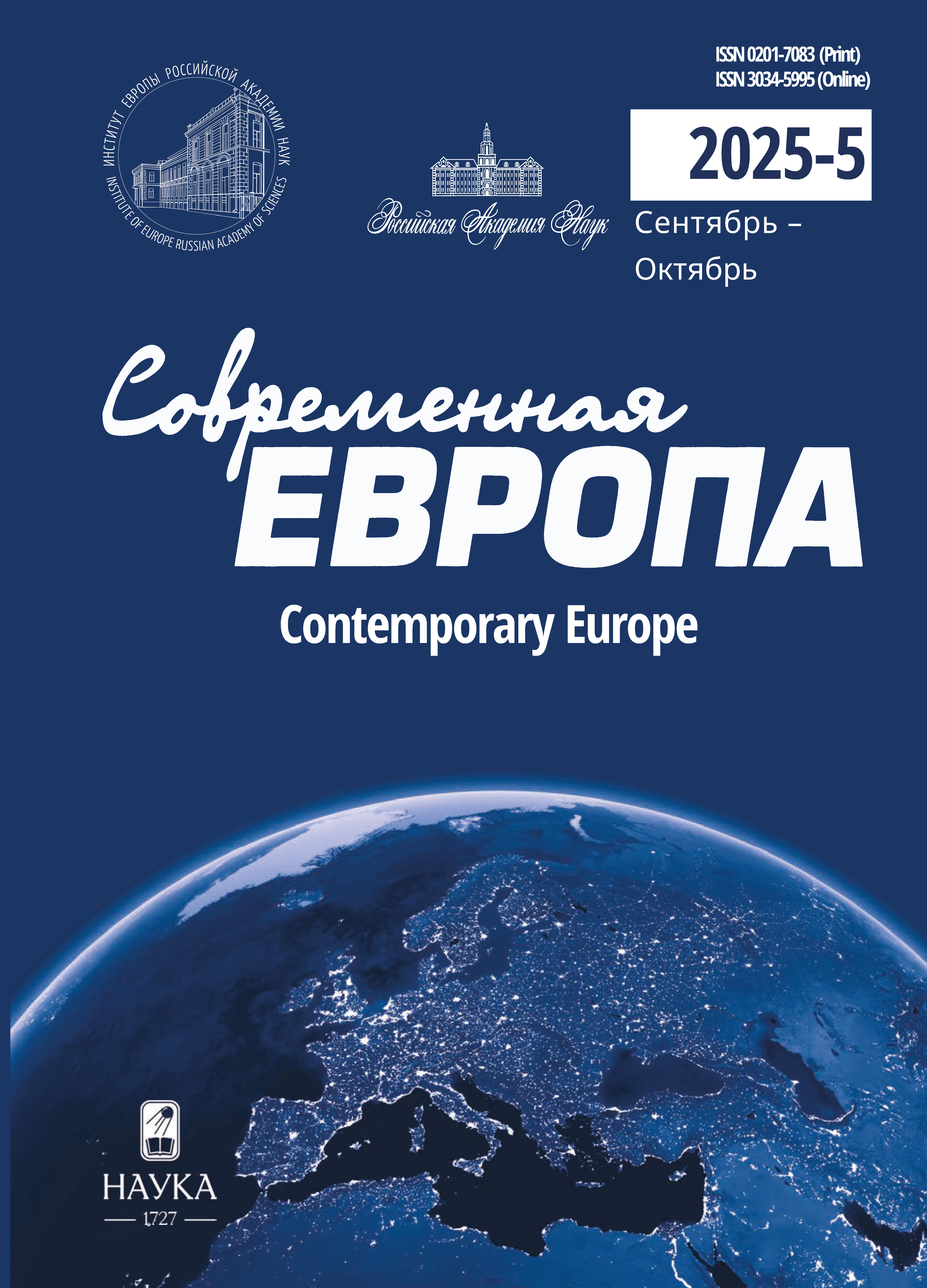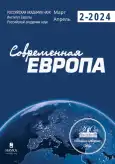Constructive Approaches to Analysis of Constructed Identity
- Authors: Fadeeva L.A1
-
Affiliations:
- Perm State National Research University
- Issue: No 2 (123) (2024)
- Pages: 175-183
- Section: Articles
- URL: https://rjsvd.com/0201-7083/article/view/652147
- DOI: https://doi.org/10.31857/S0201708324020141
- ID: 652147
Cite item
Abstract
The article deals with the main directions and outcomes of identity research along with the expansion of the research field as a whole and concept list. The author explores an interdisciplinary and multidisciplinary approach well established in identitarian research. By building a general outline and defining the comparative context of the analysis of identity in general and political identity in particular, the article explores collective monographs “Integration and disintegration potential of identity in history and modernity” and “Identity. Personality, society politics. New contours of the research field”. The interdisciplinary work of Tomsk scientists is structured into three parts, corresponding to the author’s methodology. This approach enables to characterize the key positions of the authors of each part, comparing them with the arsenal developed in the social and humanities. Scientific and political relevance characterize each of the dimensions chosen by the authors of the monograph, which also determines the high disputability of the proposed topics and assessments. The collective monograph edited by Corresponding Member of the Russian Academy of Sciences I.S. Semenenko has 44 sections written by a team of 32 authors. The article contains an overview of key sections and directions of research, and notes the role of the executive editor, who is one of the leaders of identitarian research in modern Russia. The collective monograph is aimed at promoting the issue of identity not only in scientific discussions, but also in the public space, since identity is considered as an important development resource. Despite all the differences in format, structure, objectives and approaches, these works are united by bringing identity into the mainstream of sociohumanitarian and political science, determining the potential of identity as a resource for social development, integration (or disintegration) of the society. Analysis of the research conducted gives grounds to attribute them to the successful search for an independent vector of domestic science.
About the authors
L. A Fadeeva
Perm State National Research University
Email: lafadeeva2007@yandex.ru
Doctor of Sciences (History), Professor Perm, Russia
References
- Борозняк А.И. (2014) Жестокая память. Нацистский рейх в восприятии немцев второй половины ХХ и начала ХХI века. РОССПЭН, Москва. 351 с.
- Капицын В. С. (2018) Теория и политика идентичности. НИЦ Инфра-М, Москва. 219 с.
- Котта М. (2017) Европейская идентичность: вызовы современности. Идентичность. Личность, общество, политика. Энциклопедическое издание. Отв. ред. И.С. Семененко. ИМЭМО РАН; Весь Мир, Москва. С.184‒192.
- Ленин В.И. (1967) Национальный вопрос в нашей программе. Полное собрание сочинений: в 55 т. Т. 7. Сентябрь 1902 ~ сентябрь 1903. Гос. изд-во полит. лит., Москва. С. 233‒242.
- Миллер А.И., Ефременко Д.В. (ред.) (2020) Политика памяти в современной России и странах Восточной Европы. Акторы, институты, нарративы. Издательство Европейского университета в Санкт-Петербурге, Санкт-Петербург. 632 с.
- Мчедлова М.М., Казаринова Д.Б. (2020) Политика идентичности: конкуренция новых теоретических смыслов и политических стратегий. Политическая наука. № 4. С. 13–35. doi: 10.31249/poln/2020.04.01
- Семененко И.С. (отв. ред.) (2017) Идентичность. Личность, общество, политика. Энциклопедическое издание. ИМЭМО РАН; Весь Мир, Москва. 992 с.
- Семененко И.С. (2018) Национализм, сепаратизм, демократия… Метаморфозы национальной идентичности в "старой" Европе. Полис. Политические исследования. № 5. С. 70–87. doi: 10.17976/jpps/2018.05.07
- Семененко И.С. (2020) Новые ракурсы политики идентичности: трудная память в музеях истории ХХ века. Мировая экономика и международные отношения. Т. 64. № 5. С. 16–32.
- Семененко И.С. (отв. ред.) (2023) Идентичность. Личность, общество политика. Новые контуры исследовательского поля. ИМЭМО РАН; Издательство "Весь Мир", Москва. 512 с.
- Фадеева Л.А. (отв. ред.) (2023) Политика идентичности: понятия, смыслы, практики. ИЦ "Титул"; ФГБОУ ВО "ПГНИУ", Пермь. 320 с.
- Фадеева Л.А., Назукина М.В. (2020) Институционализация политической науки в России: факторы, уровни, результаты (на примере идентитарных исследований). Политическая наука. № 1. С. 201‒220. DOI: http://www.doi.org/10.31249/poln/2020.01.08
- Фадеева Л.А., Плотников Д.С. (2022) Украинский фактор трансформации российской идентичности. Вестн. Удм. Ун-та. Социология. Политология. Международные отношения. Т. 6, вып. 4. С. 506–519. https://doi.org/10.35634/2587-9030-2022-6-4-506-519
- Харусь О.А. (ред.) (2023) Интеграционный и дезинтеграционный потенциал идентичности в истории и современности. Изд-во Томского ун-та, Томск. 272 с.
- Agarin T. (2022) The Not So Suprising Longevity of Identity Politics. Contemporary Challenges of the State-Society Compact in Central Eastern Europe. Routledge. 336 p.
- Cristensen N.N. (ed.) (2020) Political Identity and Democratic Citizenship in Turbulent Times. IGI Global Publisher of Timely Knowledge, University of Aalborg, Aalborg, Denmark. 331 p.
- Stockemer D. (2022) Muslims in the Western World. Sense of Belonging and Political Identity. Springer. 151 p.
- Younge G. (2020) Who are We? How Identity Politics Took Over the World. Pengiun. 256 p.
- Agarin T. (ed.) (2022) The Not So Suprising Longevity of Identity Politics. Contemporary Challenges of the State-Society Compact in Central Eastern Europe, Routledge.
- Boroznyak A.I. (2014) Zhestokaya pamyat’. Natsistskii reikh v vospriyatii nemtsev vtoroi poloviny XX I nachala XXI veka [Cruel memory. The Nazi Reich as perceived by Germans in the second half of the 20th and early 21st centuries], ROSSPEN, Moscow, Russia. (In Russian).
- Cotta M. (2017) Evropeiskaya identochnost’: vyzovy sovremennosti [European identity: challenges of our time], in Semenenko I.S. (ed.) Identity. Personality, society, politics. Encyclopedic edition, IMEMO RAS; Ves Mir, Moscow, Russia, pp. 184‒192. (In Russian).
- Cristensen N.N. (2020) Political Identity and Democratic Citizenship in Turbulent Times, IGI Global Publisher of Timely Knowledge, University of Aalborg, Aalborg, Denmark.
- Fadeeva L.A. (2023) Politika identichnosti: ponyatiya, smysly, kontsepty (2023) [Identity politics: concepts, meanings, practices], IC “Titul”, FSBEI HE “PGNIU”, Perm, Russia. (In Russian).
- Fadeeva L.A., Nazukina M.V. (2020) Institutsionalizatsia politicheskoi nauki v Rossii: factory, urovni, resul’taty (na primere identitarnykh issledovanii) [Institutionalization of political science in Russia: factors, levels, results (on the example of identitarian research)], Political science, 1, pp. 201‒220. DOI: http://www.doi.org/10.31249/poln/2020.01.08 (In Russian).
- Fadeeva L.A., Plotnikov D.S. (2022) Ukrainskii factor transformatsii rossiiskoi identoichnosti [Ukrainian factor of transformation of Russian identity], Vestn. Udm. unta. Sociology. Political science. International relationships, 6(4), pp. 506–519. DOI: https://doi.org/10.35634/2587-9030-2022-6-4-506-519 (In Russian).
- Kapitsyn V.S. (2018) Teoriya i politika identichnosti. [Theory and politics of identity]. NIC Infra-M, Moscow, Russia. (In Russian).
- Kharus O.A. (2023) Integratsionnyi I desintegratsionnyi potentsial identichnosti v istorii i sovremennosti [Integration and disintegration potential of identity in history and modernity], Tomsk University Publishing House, Tomsk, Russia. (In Russian).
- Lenin V.I. (1967) Natsional’nyi vopros [The national question in our program], Complete works: in 55 vol, 7, September 1902 ~ September 1903, State. political publishing house lit., Moscow, Russia, pp. 233‒242. (In Russian).
- Mchedlova M.M., Kazarinova D.B. (2020) Politika identichnosti: konkurentsia novykh teoreticheskih smyslov I politicheskih strategii [Identity politics: competition of new theoretical meanings and political strategies], Political science, 4, pp. 13–35. doi: 10.31249/poln/2020.04.01 (In Russian).
- Miller A.I., Efremenko D.V. (ed.) (2020) Politika pamyati v sovremennoi Rossii I stranakh Vostochnoi Evropy. Aktory, instituty, narrativy [The politics of memory in modern Russia and the countries of Eastern Europe. Actors, institutions, narratives], Publishing house of the European University in St. Petersburg, St. Petersburg, Russia. (In Russian).
- Semenenko I.S. (2018) Nacionalizm, separatizm, demokratiya… Metamorfozy nacional'noj identichnosti v "staroj" Evrope [Nationalism, separatism, democracy... Metamorphoses of national identity in “old” Europe], Polis. Political studies, 5, pp. 70–87. doi: 10.17976/jpps/2018.05.07. (In Russian).
- Semenenko I.S. (2020) Novye rakursy politiki identichnosti: trudnaya pamyat' v muzeyah istorii XX veka [New perspectives on identity politics: difficult memory in museums of history of the twentieth century], World Economy and International Relations, 64(5), pp. 16–32. doi: 10.20542/0131-2227-2020-64-5-16-32 (In Russian).
- Semenenko I.S. (ed.) (2017) Identichnost’. Lichnost’. Obschestvo. Politika. Entsiklopedicheskoe izdanie [Identity. Personality, society, politics. Encyclopedic edition], IMEMO RAS; Ves Mir, Moscow, Russia. (In Russian).
- Semenenko I.S. (ed.) (2023) Identichnost’. Lichnost’. Obschestvo. Politika. Novye kontury issledovatel’skogo polya [Identity. Personality. Society. Politics. New contours of the research field], IMEMO RAS; Ves Mir, Moscow, Russia. (In Russian).
- Stockemer D. (2022) Muslims in the Western World. Sense of Belonging and Political Identity, Springer.
- Young G. (2020) Who are We? How Identity Politics Took Over the World, Pengiun.
Supplementary files











